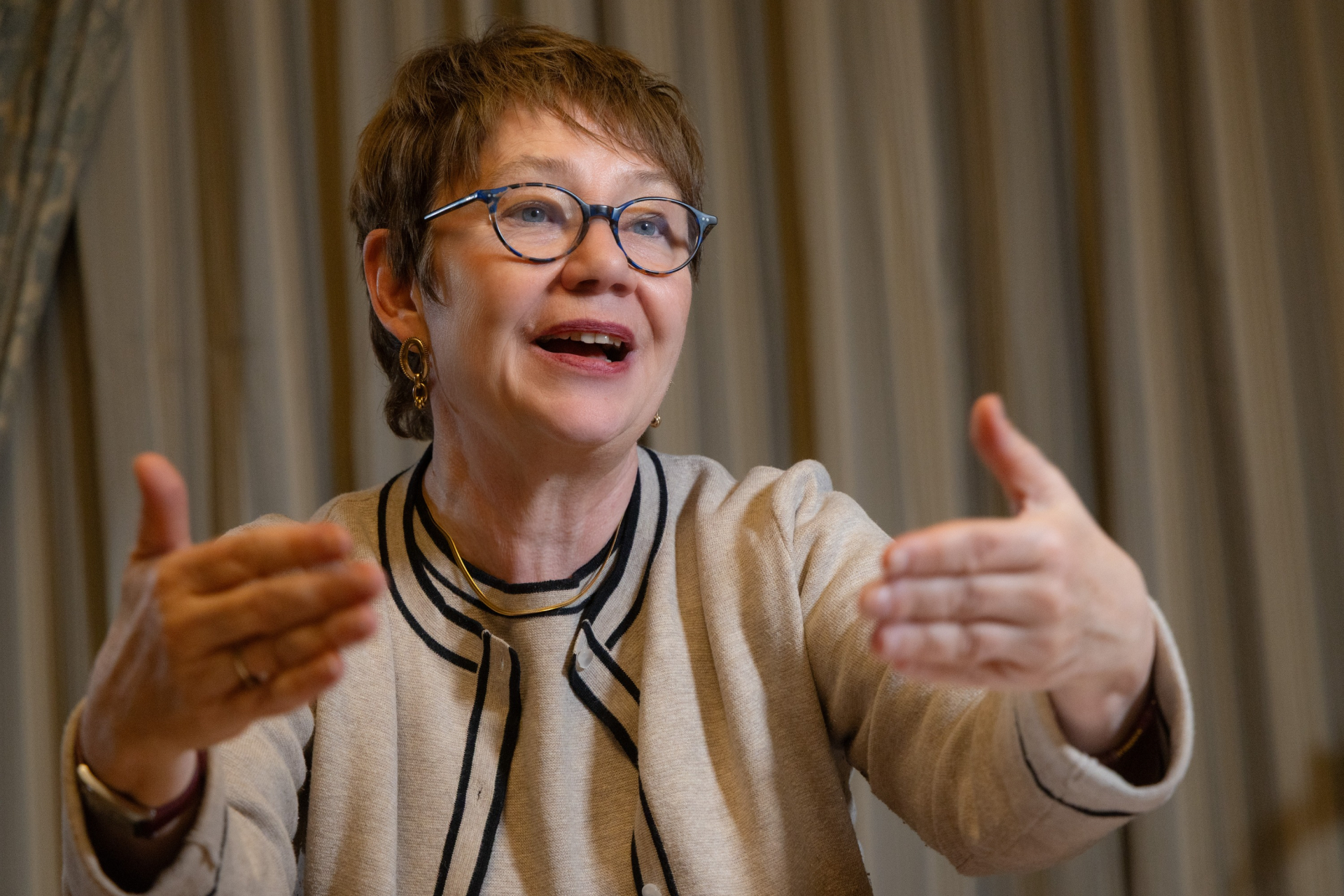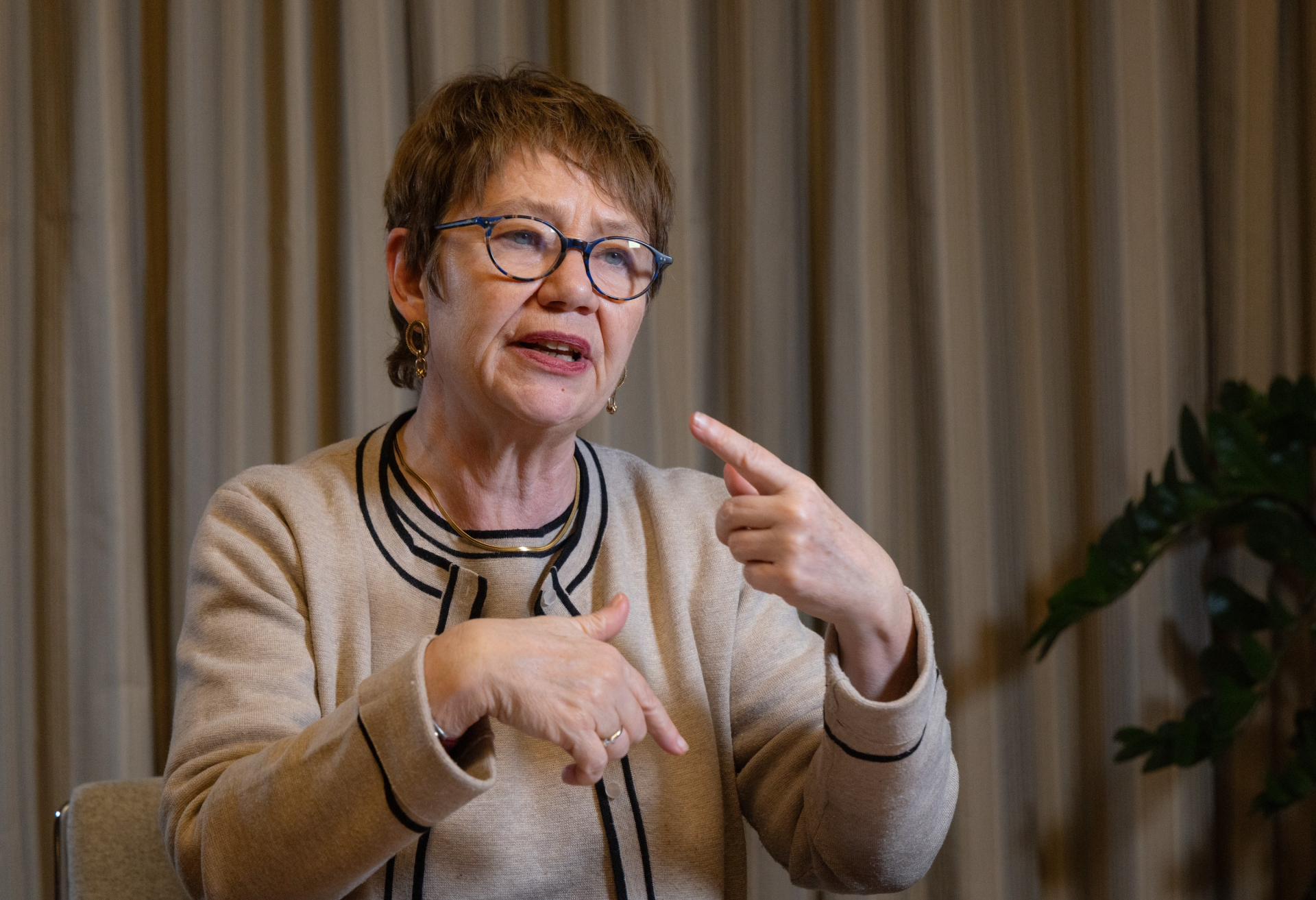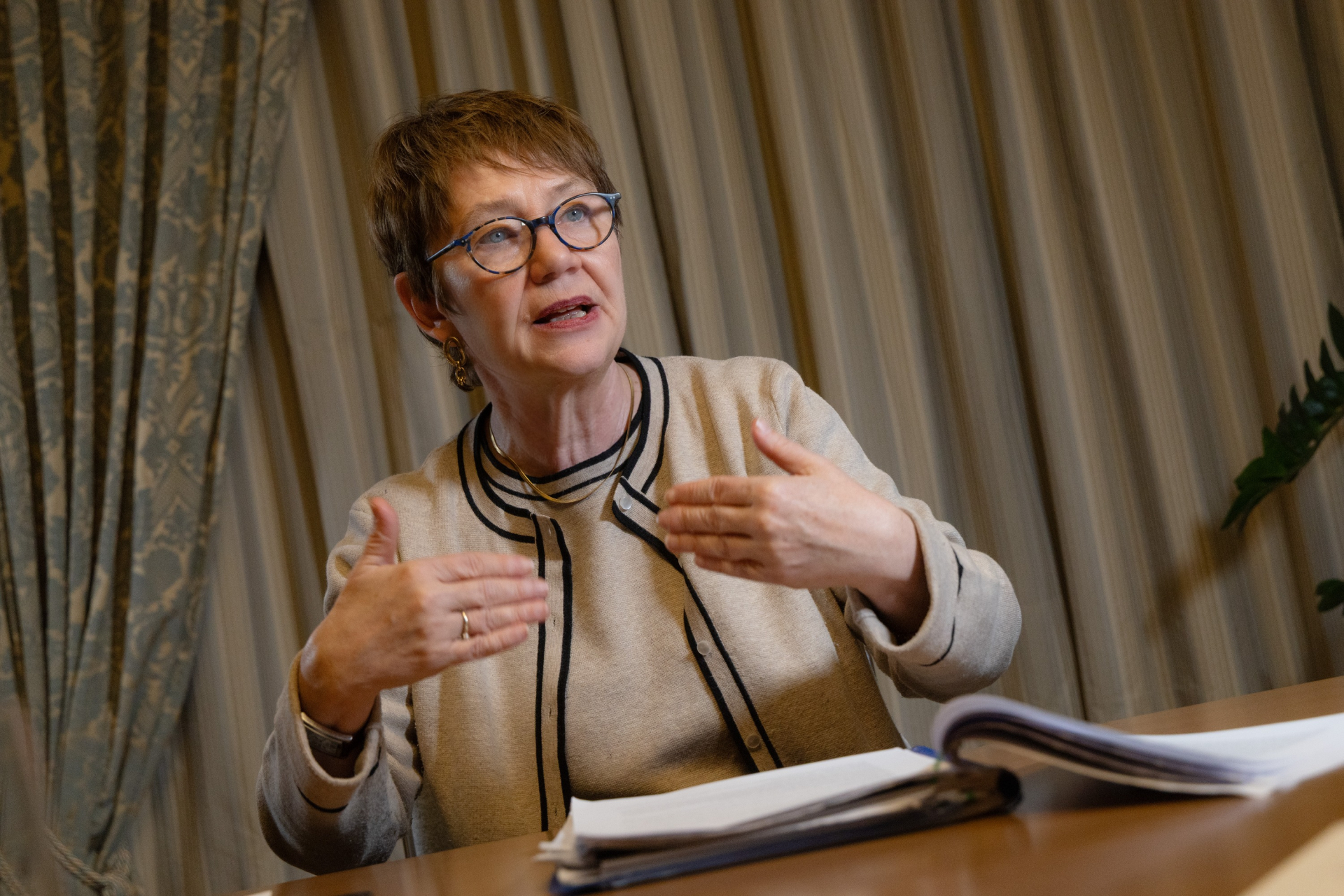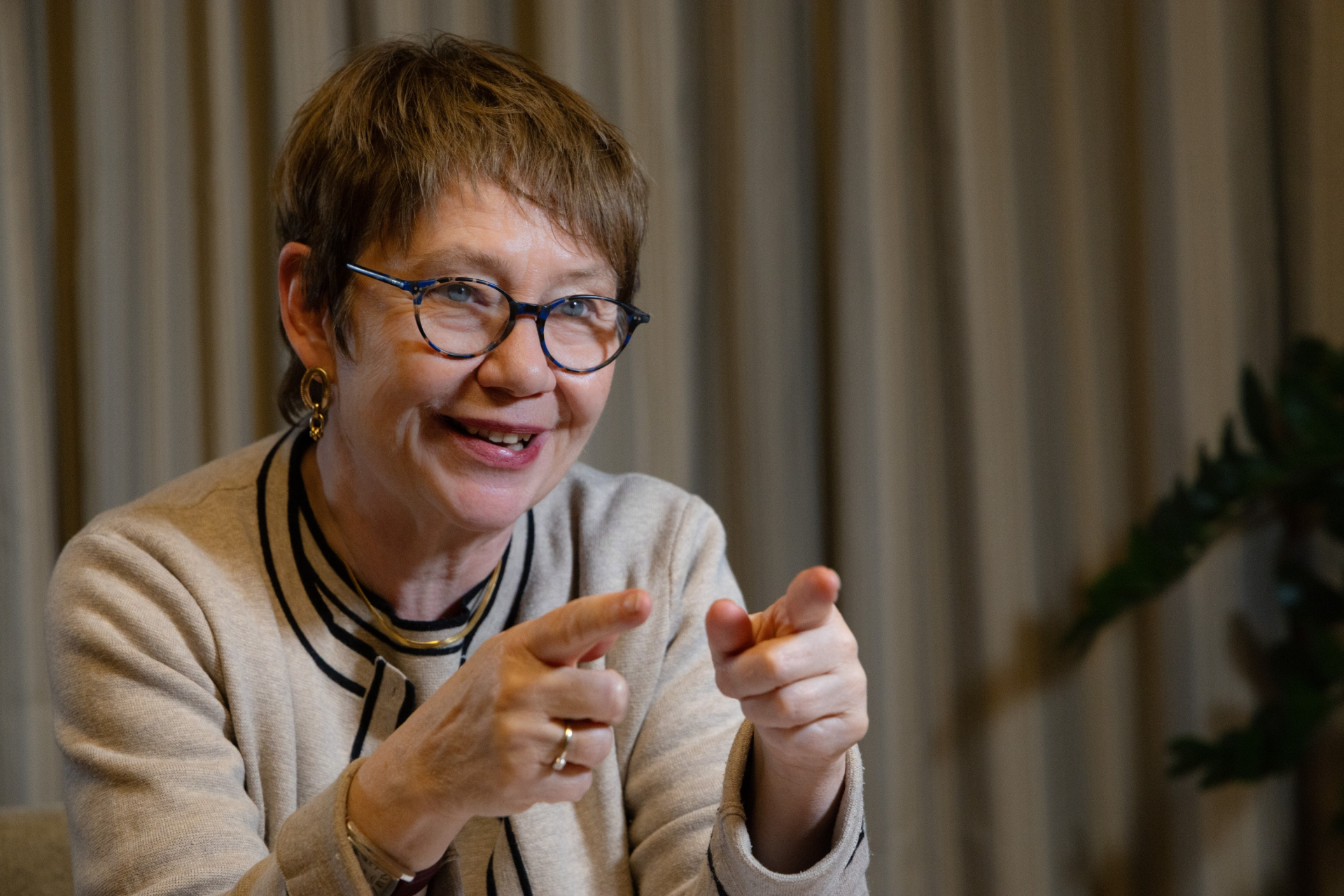European Bank for Reconstruction and Development President on Ukraine's corruption scandal and state social-benefit programmes

The abbreviation EBRD means little to most Ukrainians. At best, they may know it as one of the many international financial institutions providing money to the country during the war – and they would be right.
However, the European Bank for Reconstruction and Development operates differently from many other donors. The key distinction is that the EBRD does not provide funds to cover budget needs. Instead, it lends to businesses and state-owned companies, particularly in the energy sector.
In mid-November, amidst the corruption scandal surrounding procurement at Energoatom, the Ukrainian state-run nuclear company, EBRD President Odile Renaud-Basso arrived in Kyiv. This was her sixth visit to Ukraine since the start of the full-scale war, and her schedule was packed full of meetings with government officials who assured her of their commitment to rooting out corruption in the energy sector and refraining from interference in the management of state companies.
These assurances matter: the decisions made by the EBRD will largely determine whether Ukrainians have heating in their homes this winter. The bank plans to finance the purchase of half the additional imported gas that Ukraine will need.
In this interview with Ekonomichna Pravda, Odile Renaud-Basso spoke about whether the corruption scandal has affected the EBRD's willingness to work with Ukraine, whether the bank intends to resume cooperation with Russia and Belarus, and how it views the government's wartime cash-distribution initiatives.
What is the purpose of your current visit to Ukraine, and how many times have you visited Kyiv since the start of the full-scale invasion?
I think it's my sixth time since the full-scale invasion. I come regularly, almost twice a year.
Ukraine is a very important country of operation for us. It's one of the largest countries in which we invest. Of course, the context is quite challenging. So it's always very important and very useful to meet with the authorities, our clients and society to discuss our priorities and projects, how we can support and adjust our instruments to support Ukraine.
Before the interview, I was looking through your social media, including X, and I was surprised to see that most of your recent posts there are either about Ukraine or from Ukraine. What place does Ukraine currently occupy in the EBRD's portfolio?
It's very important. I think it's one of the largest countries of our investment. The bank has been very committed since the beginning of the war to support the country. And it's not easy, because there is more risk. But with the support of our shareholders and donors, this has been one of the top priorities of the bank.
Before the war, the EBRD was already very active in Ukraine. We invested something like €1 billion per year. For a long time we were the largest institutional investors in Ukraine, but since the war we doubled down our investment.

Up to now, for example, in 2025, we have already deployed €2.4 billion, and we still have some projects to be approved by the end of the year. Since the war started, we have deployed more than €8.5 billion overall. So, it's more than €2 billion a year.
And what is your current plan for funding Ukraine in 2026? As far as I remember, at the beginning of this year you said the EBRD would be investing €1.5 billion in Ukraine.
This was our minimum target, but we do more if possible. In the last few years we have always done more than €2 billion.
It's very difficult to assess the volume of future investment because it is also dependent on the demand. Half of our funding is with the private sector in terms of volume, and in terms of the number of projects it's much more – 90%. It will also depend on the borrowing capacity of the state-owned enterprises. But we are committed to do as much as we can.
So the minimum amount of funding for Ukraine in 2026 will be…?
Again, €1.5 billion.
Your current visit is taking place at a time when there is a corruption scandal going on in Ukraine in the energy sector, and the EBRD has worked with energy companies in Ukraine, such as Naftogaz. Have you been following this scandal, and has the EBRD done any projects with Energoatom?
We had a project with Energoatom in the past, but quite a long time ago, in 2013. We had some discussions with the company at some point, but no project has been realised. And we have no project with them now.
We are very heavily involved in the energy sector because we have deployed more than €3.2 billion with Naftogaz, with Ukrenergo, with some private sector companies in renewable energy, etc.

In what period?
Since the beginning of the war.
We have been very actively involved in corporate governance in state-owned enterprises. Sometimes we were not completely happy with what was going on in terms of the role of the government versus the role of the supervisory board.
This corruption scandal worries us. On the one hand, it shows that anti-corruption institutions function properly and independently. That's a positive thing. It was also the role of civil society, which is very positive in Ukraine.
On the other hand, this situation shows that further work has to be done to strengthen economic governance in this sector in terms of the independent supervisory board, avoiding interference from the government in the management of the companies.
There are also some other elements that can be improved in this area. For example, an independent energy regulator, to have an independent commission appointed in an open, transparent process and so forth. The quality of the appointments to the board and regulatory authorities is absolutely key. I think this is something that needs to be implemented very quickly.
Does the current corruption scandal in any way affect the EBRD's decision to continue to work with state-owned companies in Ukraine, especially in the energy sector?
We will remain vigilant and very demanding in terms of governance, and we will be even more demanding, but it doesn't mean that we are going to stop. For example, with Naftogaz, we are working on the package of additional funding for 2025 and early 2026 in order to be able to help them to buy gas. With the recent attack from Russia, there is a big gap. We have a transparent process, and we'll increase the funding in the coming weeks.
Yesterday [18 November – EP] you met with Ukrainian Prime Minister Yuliia Svyrydenko. She wrote about the meeting and mentioned that you discussed the corruption scandal. Can you tell us what she said to you?
We discussed mostly lessons to be drawn, and how to address foremost the situation of Energoatom in terms of governance, and the process to appoint a new supervisory board and how that could be handled. We are part of the nomination committee.

And we discussed what needs to be done more broadly in terms of governance in state-owned enterprises in the energy sector, to address and to avoid this kind of situation and to strengthen the governance.
I was mentioning the quality of the supervisory board, the role of the supervisory board and how decisions are taken in the companies, the role of the energy regulator. That was the core of the discussion.
Given that the EBRD has been involved in financing the Ukrainian energy sector – you mentioned €3.2 billion of funding – do you have any concerns that some of the bank's funds that were obtained by Ukrainian energy companies could have been involved in corruption?
It's a question. Of course, when we see what's going on, it's concerning globally. But we've done everything in our capacity, working with the governance, ensuring the good functioning of the governance, having a due diligence process for competition, for example, for the gas supply to Naftogaz, in order to avoid that kind of risk.
Whenever we work with the public sector, we fully control the procurement. We control the tender documentation. The government might make the decision on the tender, but we check whether that will be the same decision we would have made according to the technical specifications and so on.
With Naftogaz, there's a pre-agreed list of gas traders. When the lots are tendered, we pay the traders directly. So whenever we work in the public sector, we control the flow of funds and the procurement to the degree possible. So it's really tight.
Today [19 November – EP] you had a meeting with the Ukrainian finance minister, Sergii Marchenko, and you were talking about additional funding for purchasing gas. You mentioned two options: either moving funds from other existing projects, or providing additional financing. What are those projects, and how much additional funding does Naftogaz need?
What we would like to do is to provide €1 billion of additional credit. €500 million – half of it – would come from the reallocation of existing credit lines for investment: partly in the subsidiaries from Naftogaz, and a part of it could be from another public sector project, because we cannot have a government guarantee for new funding for Naftogaz because of the limit. So we are working on that.
It's a quick revolving credit line because Naftogaz needs to buy gas now and then distribute it to consumers for heating. We will then be able to repay in late spring, and that has been working in the last few years. Then we can reallocate the fund for the investment project. We also hope to have some donor funding for the other €500 million.
Grant funding?
Yes, they need to have some concession funding. So we hope to find some kind of support.
If I understand correctly, the EBRD provided Naftogaz with a €500 million loan in August, and you are looking for another €1 billion – is that right?
Exactly. In August the package was €500 million with the support of the EU guarantee, and earlier, in April, we did €270 million, so it's already €770 million including some grants from Norway. Then the packages were topped up with grants of €220 million, so together it is €990 million.

Now, most likely it would be another €500 million of funding and hopefully another €500 million of grant support. But the additional need for gas is 4.4 billion cubic metres, which represents €1.9 billion. So we would cover half of it.
The EBRD has provided a lot of funding for renewable energy in Ukraine, but now, in view of the Russian attacks and the need for additional energy sources, the Ukrainian government has decided to develop gas turbine generation. Are you considering financing this effort?
We prefer financing renewable energy because of our priorities. But in the case of Ukraine, because of the emergency and the need to have decentralised generation capacities, we have a special approach.
We just signed a project on gas generation and batteries last week. We also had a project with Ukrzaliznytsia [Ukrainian Railways] to develop gas generation. So we've been doing this quite actively in the last year and a half.
What is the amount of funds you have provided to projects in decentralised power generation capacities?
We had projects with Ukrnafta, Ukrzaliznytsia, etc. Altogether it's €440 million.
Before the full-scale war, talks had been underway about the EBRD taking a stake in Oshchadbank. Are those plans still relevant today?
For the period of the war, we stopped it. But we are talking with the government on the other banks.
There are two other banks – Sense Bank and Ukrgasbank – that the Ukrainian government wants to privatise. Are you interested in taking part in this process?
We cannot be the only investor. Firstly we need to see who the investors are that are interested and then, if needed, we could be a small shareholder. Sometimes we invest in pre-privatisation to help to restructure and then go to privatisation.
Why are you considering taking part in the privatisation of these two banks instead of finishing the negotiations with Oshchadbank?
It's not us. This is the government's decision as a shareholder.
But if the government decided to sell Oshchadbank, would you come back to the idea of taking part in this process?
It depends. But I think the logic there was that it required restructuring. It is also bigger. That was a different discussion.

The EBRD usually cooperates with small and medium-sized businesses through banks rather than directly. But you also provide funding to big companies. One of them is [agribusiness] MHP, which was founded by Ukrainian businessman Yuriy Kosiuk, an ally of former president Petro Poroshenko. Some people in Ukraine believe this affiliation to Poroshenko enabled MHP to receive preferential treatment from the state. How does the EBRD choose the large businesses it provides financing to?
It's a demand-driven process: clients have a need and ask for funding. We assess the need, the type of project, why they need our support. We also have due diligence on the clients, so we select clients with whom we can work. We also assess the impact of the project on the country, for the community, and the benefit for the client.
So you did due diligence in the case of Kosiuk.
Of course. We also assessed the capacity of the client, the transparency of the account, the governance of the company. It's a very tough judgment on the quality of the client and the benefits of the project per se.
Within days of the full-scale Russian invasion starting, the EBRD announced the closure of its offices in Moscow and Minsk. Are those offices closed now?
Yes, we closed in the two weeks after the invasion. And that's still closed. We have a formal decision. We do not do any investment in these two countries. Furthermore, we have not done any since 2014, but in 2022 we stopped any disbursement on existing projects. We've also very dramatically reduced our exposure. It's a complete exit.
Considering the possible peace talks that are going on today, have you considered the possibility of resuming operations with Russia and Belarus?
It's not on the agenda at all.
Under what conditions would you consider it?
It's a bit of speculation. You can imagine there is a full peace agreement, Russia has paid reparations. But I think it's not on the agenda for the time being.
Funding for Ukraine's military and civilian spending in 2026 is now entirely dependent on the EU's decision regarding the use of frozen Russian assets. There is currently no consensus among EU member states on this decision. What is the EBRD's position on this issue?
Continuing to support Ukraine is absolutely necessary. I think that the solution needs to be found because it's a question of supporting Ukraine but also a question of Europe's security. That's why the EU is really trying to find a way, because there is a clear understanding that the security of Europe is very dependent on the situation in Ukraine. And the destiny of Europe is linked with the destiny of Ukraine.
As the EBRD, we do not participate in the technical discussion on the modalities. It's a very complex issue. The solution that is on the table is innovative and addresses some concerns related to confiscation of assets.

I think there would be some agreement reached very quickly, because time is running out. The IMF is discussing a programme. It needs a financial guarantee. There is also budget preparation, and continued support – and visibility of the support – for Ukraine is very important.
As an institution, do you oppose the use of frozen Russian assets?
I think there is some distinction between asset confiscation and the scheme which is being discussed. It is about using the cash but giving some bonds instead.
Before joining the EBRD, you were also chair of the Paris Club. The Paris Club has provided Ukraine with debt relief several times. In view of that, how do you assess Ukraine's ability to repay its war debt?
This is a part of the IMF's work. The IMF is looking at the debt sustainability.
Ukraine needs to be careful about that, and that's why there is this debt ceiling and limitation on the government guarantee. But at this point in time, I think it's manageable.
Of course, it also depends on the duration of the war. That will have a big impact.
This month, the EBRD signed an agreement in France to supply Ukraine with 55 Alstom locomotives. Ukrzaliznytsia reported that this is an 18-year loan that will be repaid from the revenues it will receive from freight transportation. But Ukrzaliznytsia is currently unprofitable and does not generate such revenues. Have you considered the risk that this loan may not be repaid in the future?
The loan has a sovereign guarantee – it's guaranteed by the government of Ukraine. Ukrzaliznytsia is facing challenges, but we hope that the situation will be restored, the cost will be recovered, that there could be some savings so that the situation can be rebalanced.
At the same time, the Ukrainian government has announced a programme that will give all Ukrainians the opportunity to travel with Ukrzaliznytsia for free. How might that decision affect the company's financial situation?
It will not improve it. I think it's important to have a discussion on the medium-term plan with Ukrzaliznytsia about how the situation will evolve, how they can improve the financial situation and so forth.
As a lender for the state-owned enterprise, I think that tariffs and customer contribution are an important element for the balancing of the companies. Rather than having cross-board support, it's sometimes useful to move to price recoveries, so that the clients pay for the services, but they may receive targeted support from the budget – the most fragile part of the population. That may be a more efficient way.

It's an ongoing discussion with Ukrzaliznytsia. We need to learn about their strategy and see that the company is able to pay us back.
In addition to the free travel programme, the government has decided to give every Ukrainian UAH 1,000 – about US$24. Are you concerned about this policy of the Ukrainian authorities during the war?
It's a political decision of the government, which I respect. However, the government has to balance strong budget constraints and the fiscal capacity to support people and the economy in the most effective way.
You said that Ukraine is one of the biggest recipients of EBRD funding. Are any of the bank's shareholders concerned about that, especially considering the fact that the Ukrainian stake in the bank's portfolio is still growing?
No, I think there is very strong support from our shareholders to support Ukraine. There was a decision after the beginning of the war to provide us with more capital in order to be able to support the Ukrainian economy.
Of course, they want the bank to remain sound and solid and keep our AAA credit rating while supporting Ukraine. And that's what we are doing. There is very wide support. We also received a lot of donor support in the form of guarantees or grants. I think it's a record level of donor support: we have never received such an amount for any other country. €3 billion of donor support for Ukraine going through the EBRD.
What kind of donor support? Grants?
Sometimes it's grants, sometimes it's guarantees. We talk with the donors. Some of them want to provide support through the banks, some want to provide support for the energy sector, etc. Each country has its priorities. The EU is the largest one, but we also received a lot of support from the US, Norway, the Netherlands, France, Germany, Italy, Spain.
Beyond its efforts to finance the Ukrainian economy during the war, does the EBRD have any other involvement with Ukraine?
Sure. We are actively supporting Ukraine's reform agenda. We have a reform support team – 320 people working in different teams in the government.
In what sectors?
We have a team with the prime minister, in the Ministry of Infrastructure, in the Ministry of Economy, etc. We help with the EU accession negotiation. That's one dimension of the policy work.
We also work a lot on human capital: in 80% of the projects, we have a human dimension, which is either to help with the workforce or facilitate the integration of veterans. This is kind of more psychological support for veterans in integration and support, because we see that that's one of the key challenges.
Author: Yaroslav Vinokurov
Editing: Teresa Pearce









